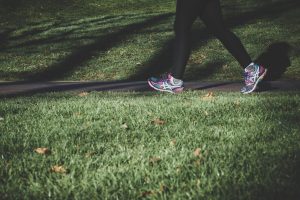This is a really interesting article. It looks at the benefits of movement and exercise and is written by a fellow Solution Focussed Hypnotherapist, Sarah Stanley.
Imagine if there was a pill that would make you healthier, smarter, and happier! A pill that made you age more slowly and even improved your memory! I think there would be a pretty long queue, even if you did have to stand 2 metres apart!
But is there another way to achieve these fantastic outcomes?
We human beings are complex beings. To function at an optimal level, a number of things are needed. Nutrition, sleep, meditation, continuous learning, stress reduction, and human connection all play a part.
But there is one overwhelming factor that keeps us functioning at our best, and that is movement.
The Brain-Fitness Connection
Dr Ratey MD Harvard has established himself as one of the world’s foremost authorities on the brain-fitness connection. He says:
”Movement moving your body, moving the muscles, pushing yourself to do something more than you did before, boosts our capacity for focus and learning and lifts our mood, not unlike taking a little bit of Prozac and a little bit of Ritalin”
Exercise is proven to be one of the most effective ways of regulating our emotions.
Exercise can:
Reduce stress and anxiety
Promote good physical and mental health
Optimise our cognitive function and our ability to learn and process
Reducing Stress and Anxiety
Physical activity is nature’s way of preventing stress. Exercise can ward off the negative effects of chronic stress and even reverse them.
Studies show that people who add physical activity to their lives become more socially active, increasing their confidence and helping to build social connections.
The recent government report from ‘Moving Communities’ shows that the growth of group exercise in the UK has provided much needed social connection and feelings of togetherness, which are so important in reducing loneliness.
Improving Your Health. And Looking Younger!

Exercise increases your heart rate, which means more oxygen is pumped to the brain. This increases the plasticity of your brain and encourages the growth of new brain cells.
By increasing blood flow, sending more oxygen and eliminating waste, exercise also helps to keep skin healthy and looking younger. Plus, you get all the benefits of increased muscle tone and flexibility, and improved sleep quality.
And of course, exercise also helps you maintain a healthy weight, reducing the risk of developing certain types of cancers, cardiovascular disease, and diabetes.
It is also likely that your diet will improve as you become more physically active.
Boosting Your Brain – Improving your memory and cognitive function
For me, the most exciting benefit of more exercise is the activation of BDNF.
What is BDNF? BDNF is ‘Brain Derived Neurotrophic Factor’. Otherwise known as fertiliser for the brain!
BDNF is a powerful little protein that stimulates the production of new brain cells and strengthens existing ones. It helps to increase the size of the hippocampus, an area of the brain that plays an important role in memory and learning.
Low levels of BDNF can be associated with depression, anxiety, and memory and brain degeneration. Therefore, it’s not surprising that BDNF is a popular ingredient in mood elevating drugs.
In order to increase our production of BDNF by natural means, we need to stimulate the cells. And research shows that the best way to do this is to establish a regular exercise routine.
As little as 30 minutes intensive exercise three times a week can significantly increase brain function. For example, power walking, cycling, or running.
This is a great starting point achievable for most of us! But, if you want to maximise your brain’s potential, add a skills-based exercise. The brain wants to learn. If we don’t challenge it, atrophy and shrinkage can set in.
Skills-based exercise strengthens and expands neural connections. The more complex the movements the more complex the brain connections. Ratey 2010, states that skills-based exercise will activate areas of the brain areas that:
“control balance, timing, sequencing, evaluating consequences, switching, error correction, fine motor adjustment, inhibition, and of course, intense focus and concentration.”
 Skills-based exercise includes dance, tennis, football, and boxing! If you prefer something more gentle, try yoga, Tai Chi, or Pilates.
Skills-based exercise includes dance, tennis, football, and boxing! If you prefer something more gentle, try yoga, Tai Chi, or Pilates.
If you are struggling with a mental health issue, exercise may be the last thing you feel like doing. But if you can find the motivation to take that first step, the benefits can be really powerful.
As with any new goals, the best advice is to start small. Build your fitness slowly. Walk before you run. Find an activity you enjoy and make it a regular part of your routine. One of the best things about physical activity is that there are many options. You just need to find the one that suits you.
And get support if you can. Someone to share your challenges and achievements with. This can be a great motivator and help to keep you on track.
If you need help with motivation to get started , contact me for a FREE initial consultation on 07516 962361.
Remember small steps lead to bigger challenges.
